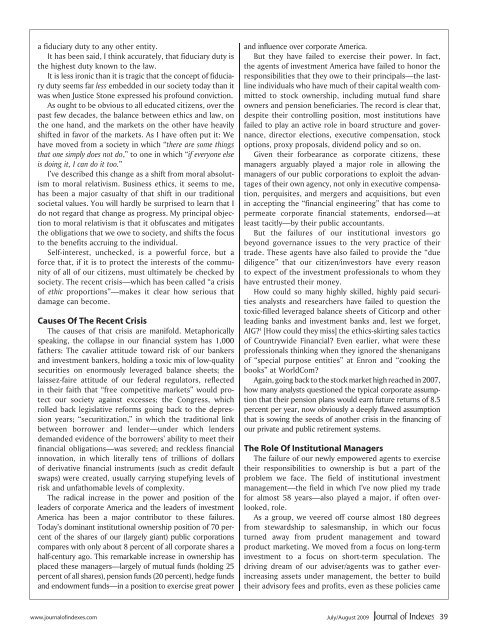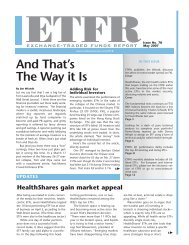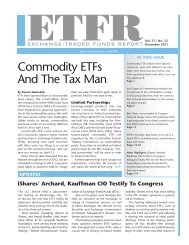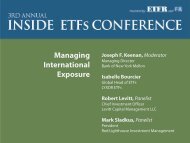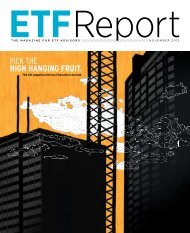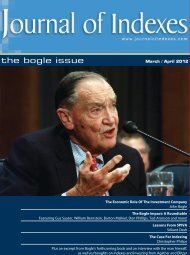How to Kill a Black Swan Remy Briand and David Owyong ...
How to Kill a Black Swan Remy Briand and David Owyong ...
How to Kill a Black Swan Remy Briand and David Owyong ...
You also want an ePaper? Increase the reach of your titles
YUMPU automatically turns print PDFs into web optimized ePapers that Google loves.
a fiduciary duty <strong>to</strong> any other entity.<br />
It has been said, I think accurately, that fiduciary duty is<br />
the highest duty known <strong>to</strong> the law.<br />
It is less ironic than it is tragic that the concept of fiduciary<br />
duty seems far less embedded in our society <strong>to</strong>day than it<br />
was when Justice S<strong>to</strong>ne expressed his profound conviction.<br />
As ought <strong>to</strong> be obvious <strong>to</strong> all educated citizens, over the<br />
past few decades, the balance between ethics <strong>and</strong> law, on<br />
the one h<strong>and</strong>, <strong>and</strong> the markets on the other have heavily<br />
shifted in favor of the markets. As I have often put it: We<br />
have moved from a society in which “there are some things<br />
that one simply does not do,” <strong>to</strong> one in which “if everyone else<br />
is doing it, I can do it <strong>to</strong>o.”<br />
I’ve described this change as a shift from moral absolutism<br />
<strong>to</strong> moral relativism. Business ethics, it seems <strong>to</strong> me,<br />
has been a major casualty of that shift in our traditional<br />
societal values. You will hardly be surprised <strong>to</strong> learn that I<br />
do not regard that change as progress. My principal objection<br />
<strong>to</strong> moral relativism is that it obfuscates <strong>and</strong> mitigates<br />
the obligations that we owe <strong>to</strong> society, <strong>and</strong> shifts the focus<br />
<strong>to</strong> the benefits accruing <strong>to</strong> the individual.<br />
Self-interest, unchecked, is a powerful force, but a<br />
force that, if it is <strong>to</strong> protect the interests of the community<br />
of all of our citizens, must ultimately be checked by<br />
society. The recent crisis—which has been called “a crisis<br />
of ethic proportions”—makes it clear how serious that<br />
damage can become.<br />
Causes Of The Recent Crisis<br />
The causes of that crisis are manifold. Metaphorically<br />
speaking, the collapse in our financial system has 1,000<br />
fathers: The cavalier attitude <strong>to</strong>ward risk of our bankers<br />
<strong>and</strong> investment bankers, holding a <strong>to</strong>xic mix of low-quality<br />
securities on enormously leveraged balance sheets; the<br />
laissez-faire attitude of our federal regula<strong>to</strong>rs, reflected<br />
in their faith that “free competitive markets” would protect<br />
our society against excesses; the Congress, which<br />
rolled back legislative reforms going back <strong>to</strong> the depression<br />
years; “securitization,” in which the traditional link<br />
between borrower <strong>and</strong> lender—under which lenders<br />
dem<strong>and</strong>ed evidence of the borrowers’ ability <strong>to</strong> meet their<br />
financial obligations—was severed; <strong>and</strong> reckless financial<br />
innovation, in which literally tens of trillions of dollars<br />
of derivative financial instruments (such as credit default<br />
swaps) were created, usually carrying stupefying levels of<br />
risk <strong>and</strong> unfathomable levels of complexity.<br />
The radical increase in the power <strong>and</strong> position of the<br />
leaders of corporate America <strong>and</strong> the leaders of investment<br />
America has been a major contribu<strong>to</strong>r <strong>to</strong> these failures.<br />
Today’s dominant institutional ownership position of 70 percent<br />
of the shares of our (largely giant) public corporations<br />
compares with only about 8 percent of all corporate shares a<br />
half-century ago. This remarkable increase in ownership has<br />
placed these managers—largely of mutual funds (holding 25<br />
percent of all shares), pension funds (20 percent), hedge funds<br />
<strong>and</strong> endowment funds—in a position <strong>to</strong> exercise great power<br />
<strong>and</strong> influence over corporate America.<br />
But they have failed <strong>to</strong> exercise their power. In fact,<br />
the agents of investment America have failed <strong>to</strong> honor the<br />
responsibilities that they owe <strong>to</strong> their principals—the lastline<br />
individuals who have much of their capital wealth committed<br />
<strong>to</strong> s<strong>to</strong>ck ownership, including mutual fund share<br />
owners <strong>and</strong> pension beneficiaries. The record is clear that,<br />
despite their controlling position, most institutions have<br />
failed <strong>to</strong> play an active role in board structure <strong>and</strong> governance,<br />
direc<strong>to</strong>r elections, executive compensation, s<strong>to</strong>ck<br />
options, proxy proposals, dividend policy <strong>and</strong> so on.<br />
Given their forbearance as corporate citizens, these<br />
managers arguably played a major role in allowing the<br />
managers of our public corporations <strong>to</strong> exploit the advantages<br />
of their own agency, not only in executive compensation,<br />
perquisites, <strong>and</strong> mergers <strong>and</strong> acquisitions, but even<br />
in accepting the “financial engineering” that has come <strong>to</strong><br />
permeate corporate financial statements, endorsed—at<br />
least tacitly—by their public accountants.<br />
But the failures of our institutional inves<strong>to</strong>rs go<br />
beyond governance issues <strong>to</strong> the very practice of their<br />
trade. These agents have also failed <strong>to</strong> provide the “due<br />
diligence” that our citizen/inves<strong>to</strong>rs have every reason<br />
<strong>to</strong> expect of the investment professionals <strong>to</strong> whom they<br />
have entrusted their money.<br />
<strong>How</strong> could so many highly skilled, highly paid securities<br />
analysts <strong>and</strong> researchers have failed <strong>to</strong> question the<br />
<strong>to</strong>xic-filled leveraged balance sheets of Citicorp <strong>and</strong> other<br />
leading banks <strong>and</strong> investment banks <strong>and</strong>, lest we forget,<br />
AIG? 1 [<strong>How</strong> could they miss] the ethics-skirting sales tactics<br />
of Countrywide Financial? Even earlier, what were these<br />
professionals thinking when they ignored the shenanigans<br />
of “special purpose entities” at Enron <strong>and</strong> “cooking the<br />
books” at WorldCom?<br />
Again, going back <strong>to</strong> the s<strong>to</strong>ck market high reached in 2007,<br />
how many analysts questioned the typical corporate assumption<br />
that their pension plans would earn future returns of 8.5<br />
percent per year, now obviously a deeply flawed assumption<br />
that is sowing the seeds of another crisis in the financing of<br />
our private <strong>and</strong> public retirement systems.<br />
The Role Of Institutional Managers<br />
The failure of our newly empowered agents <strong>to</strong> exercise<br />
their responsibilities <strong>to</strong> ownership is but a part of the<br />
problem we face. The field of institutional investment<br />
management—the field in which I’ve now plied my trade<br />
for almost 58 years—also played a major, if often overlooked,<br />
role.<br />
As a group, we veered off course almost 180 degrees<br />
from stewardship <strong>to</strong> salesmanship, in which our focus<br />
turned away from prudent management <strong>and</strong> <strong>to</strong>ward<br />
product marketing. We moved from a focus on long-term<br />
investment <strong>to</strong> a focus on short-term speculation. The<br />
driving dream of our adviser/agents was <strong>to</strong> gather everincreasing<br />
assets under management, the better <strong>to</strong> build<br />
their advisory fees <strong>and</strong> profits, even as these policies came<br />
www.journalofindexes.com July/August 2009<br />
39


